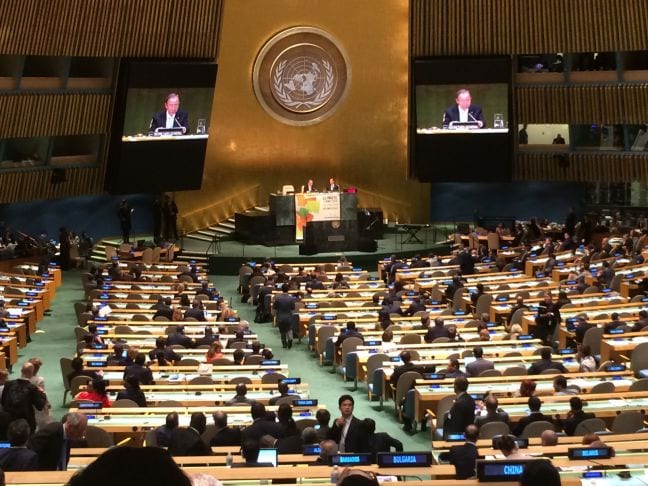On Tuesday, thousands of the great and the good met in Paris for the latest in a long line of climate summits. Initiated in July by French President Emmanuel Macron, it fell, not coincidentally, on the two-year anniversary of the Paris Agreement.
With three goals – “Take tangible and collective action, innovate, support one another” – it is part of his efforts to maintain France’s status as the pace-setter on climate change, in ever-growing contrast to the Trump administration’s enthusiastic environmental vandalism.
Trump was explicitly not invited, in fact, to an event with the cheeky tagline of ‘Make Our Planet Great Again.’
Macron warned the audience (which included the usual suspects – Schwarzenegger, Gates, Branson, et al) that
“We’re losing the battle, make no mistake. We’re having a good time, it’s nice to meet here, and today’s a great day because like-minded people are together, we’re getting to know one another. And that seems great, but we’re losing the battle .”
The recent rise in human emissions (after a reported plateauing), and the stunning temperature rises in the Arctic are part of that failure.
The day saw the European Union announce funding of €9 billion for sustainable cities, clean energy and sustainable agriculture. 224 investors, with more than $26 trillion under management, spoke through Institutional Investors Group on Climate Change. The IIGCC said its members would work with companies to help them reduce emissions over the next five years, but stopped short of saying this would include divesting from companies with large fossil fuel holdings.
The event is the latest in a much longer line of climate summits which try to focus attention and generate momentum. However, while most previous summits have involved mitigation policies, motherhood statements and unmemorable memos about more meetings, this one may be different, because investment dollars are starting to shift.
Summits going on
While ‘summits to solve problems’ are time-honoured, and can lead to new organisations (the 1975 Rambouillet talks to discuss economic problems led to the formation of the G7) political gatherings on climate change date back to the early 1980s.
Climate scientists and switched-on politicians (including a young Al Gore) attempted to sustain momentum that had been building under Carter and was fading under the new Reagan administration.
Eight years later, George HW Bush promised on the 1988 Presidential campaign trail to “use the White House effect against the greenhouse effect” and to hold an international conference within a year of taking office. However, once in office he dragged his feet. When the event finally happened in April 1990 it emerged that the chair of the Intergovernmental Panel on Climate Change, Bert Bolin, had not been invited.
Climate summits have come thicker and faster since then, either through the United Nations Framework Convention on Climate Change (UNFCCC), alongside it (eg. the UK effort at the UN Security Council in 2007), or in a spoiler role – the efforts of George Bush Jr and Australian Prime Minister John Howard, both of whom refused to enact the Kyoto Protocol to create an ‘Asia Pacific Forum on Clean Development and Climate.‘
The motives of the summit-callers vary. They might be trying to highlight intent and bask in a contrast (as Macron is doing here), gaining green votes with little effort. They might be to trying regain lost ground – in 2007 Kevin Rudd, who would soon become Australian Prime Minister after ‘the first climate change election’, called a National Climate Summit to wrest back the climate agenda, after John Howard u-turned on his climate policy intransigence and asked a senior public servant, Peter Shergold, to investigate an emissions trading scheme.
Malcolm Turnbull, now Prime Minister and then the new environment minister, dismissed it; “I’m afraid to say that the people who are going, however well-intentioned, are being used by Kevin Rudd as props to promote himself.”
Turning the tide
So far so normal. The climate debate has always been about managing the politics; political summits have always been about the signalling of virtue and/or holding back the tide as best as possible. This one though, has Macron as Canute commanding the tide to come in.
There are two interrelated reasons why this is one to watch. Firstly, the unity of the fossil fuel industry is splintering. The coal industry fear after the Paris conference that they would “be hated like slave traders” is coming true, despite Trump’s ‘coal is back’ efforts. The recent UNFCCC Bonn climate conference saw the announce of a ‘Powering Past Coal Alliance”. Michael Bloomberg is funding a global ‘beyond coal’ effort. Coal is being thrown under the bus.
Secondly, and perhaps not unrelated, is the technological and economic developments which see “clean energy approaching a tipping point.” The price of solar panels collapsing, new interest in concentrated solar thermal and great enthusiasm (the upswing of the hype cycle ) around energy storage. Investors are shifting to renewables, and doubtless there will be more announcements of new renewables being made. The summit will be not so much virtue signalling as venture (capital) signalling.
There will be trouble ahead
The danger, then, is not that Macron’s summit will extend a policy stalemate, but that it will entrench the notion – pushed aggressively and slickly by Shell – of gas as a ‘transition’ fuel (it is not) and reinforce the comforting belief that the techno-cavalry with arrive to save us.
To meet the Paris Agreement’s commitment of keeping global warming to less than two degrees (let alone the probably impossible 1.5), we are going to have to accelerate not just the growth of renewables, but also understand that incumbents will fight in clever determined and diverse ways to defend their interests. For those geeks who have pay-wall privileges, here is new academic work on overcoming policy resistance,
For those who continue to need to believe that we can get out of this mess, the real danger is no longer “intransigence”, but that summits like this will be used to reinforce business as usual with a green lick of paint.











